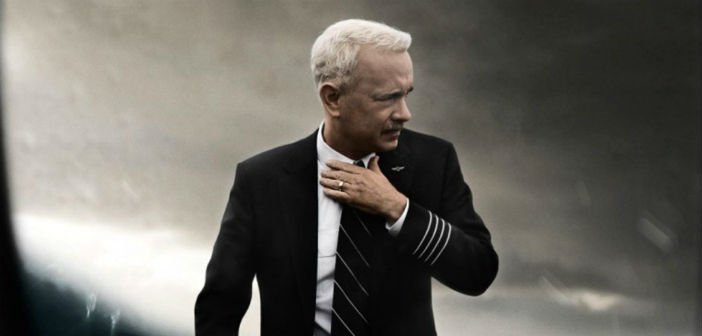You’d be hard-pressed to find an American citizen lacking at least a vague familiarity with the “Miracle on the Hudson,” where an experienced US Airways pilot guided a disabled A320 into the frigid waters of the Hudson River after losing both engines shortly after takeoff. The successful maneuvering of the aircraft into a relatively safe landing saved the lives of 155 passengers and crew members survived, and turned the captain – Chesley “Sully” Sullenberger – into an overnight sensation.
Clint Eastwood’s Sully finds the legendary director exploring the heroism of an ordinary American, whose years of experience and training left him in a unique position to accomplish the extraordinary. As one official notes during the film, it’s rare for members of the National Transportation Safety Board (NTSB) to meet with the survivors of a water landing – because there generally aren’t any survivors to meet with. That’s of little comfort to Sully (Tom Hanks), who spends the days following the incident haunted by visions of what might have gone wrong. He relives those fateful 208 seconds over and over, questioning whether another outcome was possible, and whether he made the right choice to gamble with the lives of everyone else aboard the flight.
And Sully isn’t the only one second-guessing the decisions that were made in the cockpit, as a panel of NTSB officials repeatedly grill Sully and First Officer Jeff Skiles (Aaron Eckhart) about everything from the date of their last drink to the number of hours they slept the night before. Evidence indicates that one of the engines was still operational – contrary to Sully’s report of the incident – and simulation data shows the plane had enough power to return safely to LaGuardia, or to nearby Teterboro, despite the captain’s insistence that neither option was viable. “What if I got this wrong?” he laments to his wife (Laura Linney) as he nervously paces the floor of his hotel room.

Sully’s doubts and misgivings are to be expected for someone who just lived through a traumatic event, and his newfound fame only serves to exacerbate the situation. Thrust into the spotlight and sitting for interviews with some of the biggest names in journalism, he’s clearly uncomfortable with the amount of attention being lavished upon him – in fact, as far as Sully’s concerned, he’s just a regular guy who showed up for work and did his job to the absolute best of his ability. The salvation of 155 lives – including his own – is merely a byproduct of his professionalism and work ethic.
There’s no doubt that the real-life Chesley Sullenberger is a compelling figure, but Eastwood’s film does little to paint his cinematic counterpart in the same light. Instead, he makes the curious decision to frame the protagonist as a heroic outsider, being persecuted by a group of bureaucrats for the simple crime of doing the right thing. Every interaction between Sully and the NTSB review board features the captain as the pinnacle of composure and professionalism, while the investigators come across like cartoon villains, gleefully twirling their mustaches and searching for every opportunity to cast doubt on Sully’s competence. Not only is the conflict unnecessary, it’s also fabricated – transcripts of the real-life NTSB hearings indicate that Captain Sullenberger was treated with the utmost respect and dignity, and his decision-making was never called into question.
Sully‘s best sequence come during the second act, when the audience finally witnesses the event on which the entire film has been predicated. Told from a variety of different perspective, the moments leading up to the crash and the ensuing rescue effort by some of New York City’s first responders are absolutely riveting. We’re briefly reminded just how great of a filmmaker Eastwood can be when he’s at the top of his game, but the rest of the film comes across like he’s merely going through the motions. Both Hanks and Eckhart turn in commendable performances here, but that’s not a significant achievement when they’re the only characters that seem even remotely authentic. As Sully’s wife, Linney serves no purpose other than to add to her husband’s stress and fill some additional screen time, and Anna Gunn and Mike O’Malley are squandered as the ludicrously villainous NTSB investigators.

Even at a lean 96 minutes – the shortest film of Eastwood’s career – Sully feels like it’s been padded and stretched almost to the point of breaking. Aside from its enthralling multi-POV portrayal of the crash, and a clever alternate version shown solely from the cockpit during the film’s climax, there’s very little for the audience to latch onto. This should have been a rousing, emotional tale of bravery and valor, but instead we’re left with a sterile, by-the-numbers docudrama that is seldom worthy of its pedigree. Chesley Sullenberger is a hero, that much is certain – he just needed someone else to tell his story.
The remarkable event that inspired this film doesn't offer enough material to fill its 96-minute running time. Eastwood's latest might be his best effort in years, but it's still filled with questionable narrative decisions and a conspicuous lack of genuine emotion.
-
Score6

